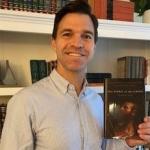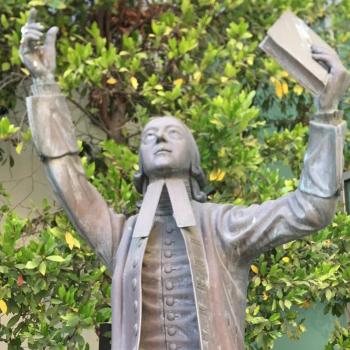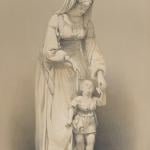The spiritual awakening at Asbury University prompts many to ask questions about what authenticates the work of the Holy Spirit in a revival. Here are 5 things you should know about the work of the Spirit in revivalism based on the work of Jonathan Edwards, Princeton University president and leader of the Great Awakening in the 1730’s.

According to Edwards, of far greater importance than any bodily effects that happen at revivals are the positive moral and spiritual effects. This includes for Edwards local taverns closing down, rebellious youths living more godly lives, and so forth. Sinners were converted and Christians renewed in great numbers, for many had been convicted of their sins due to this great outpouring from the Lord (see Some Thoughts Concerning the Revival; reprinted in The Great Awakening, ed. C. C. Goen; New Haven: Yale University Press, 1972: 441; see also my A Time to Laugh, 150).
In essence, the Great Awakening had changed New England. With regard to the positive fruits, Edwards concludes, “Now if such things are enthusiasm, and the fruits of a distempered brain, let my brain be evermore possessed of that happy distemper!” (Edwards, Some Thoughts Concerning the Revival, 341).
Marks that Do Not Rule out God’s Spirit in a Revival
In support of revival, Edwards wrote, The Distinguishing Marks of a Work of the Spirit of God (1741). In this work he gives a list of signs which are not evidence that a work is not from the Holy Spirit. He elaborates that such is the case if a work:
(1) is unusual
(2) is attended by bodily effects such as groanings, tremblings, and outcries,
(3) occasions attention and talk about religion
(4) constitutes great impressions on the mind
(5) incorporates various means, such as good examples, for its success
(6) has imprudence or irregular conduct
(7) is intermingled with delusions from Satan
(8) has some who fall into errors, or
(9) earnestly promotes judgment from God’s law
None of these signs indicates that a work is not of God (Edwards, Distinguishing Marks, 89–108; in Goen, ed., Great Awakening).
5 Things that Do Mark God’s Spirit being Present in a Revival
The things that do mark a work as being of the Holy Spirit are that:
(1) it confirms the message of Christ and the gospel
(2) it operates against the kingdom of Satan by turning people away from sin
(3) it prompts a greater regard for Scripture
(4) it leads to truth instead of falsehood, and
(5) it leads to a spirit of love.
Edwards concludes that if the fruits produced include a saint and evangelist such as David Brainerd, the critics can call “true experiential religion” whatever they will (see David S. Lovejoy, Religious Enthusiasm in the New World: Heresy to Revolution, 192).
These four principles on the character of revivals of the past are also worth repeating:
- Revivals of the past were marked by the centrality of the presence of God
- Revivals of the past called for the renewal of the churchgoer, the repentance of those in sin, and even changes in society
- Revival events are descriptive, not necessarily prescriptive
- Prayer, worship, evangelism, and the reading of Scripture are marks of authentic revival
For elaboration on these four principles, see my earlier post on the Asbury Revival. Also, for further discernment on revivals, see “Revival and Worship Today: Lessons from the Great Awakening.”
Similar to what Edwards wisely stated, say whatever you will about the current movement that has started at Asbury, but in the end what will determine it as a work of the Holy Spirit, a revival sent from God, will be its the lasting fruit that impacts church and society for years to come.



















